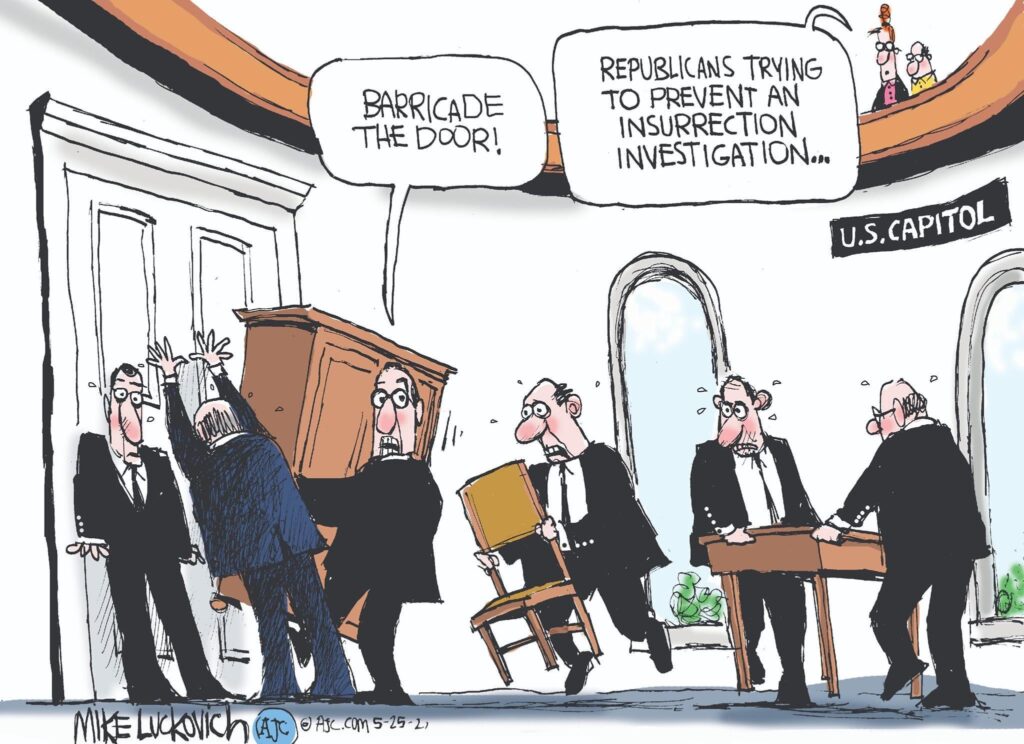No former US president has ever been charged with a crime.
Regardless of how excited some of Donald Trump’s opponents might have become this week at his growing legal discomfort, it’s still far from certain that might change anytime soon.
The Washington Post reported on Tuesday night that the Manhattan District Attorney has convened a Grand Jury to decide whether or not to indict the twice-impeached former president, and if so on what charges. The “special” jury was apparently set up recently and will sit for three days a week for six months and is empowered to examine a range of potential wrongdoing involving the whole Trump Organization.
But while there is no certainty that moving into this part of the “expansive” investigation process – which has been going on for two years – will result in charges against Trump or anyone else, it indicates that DA Cyrus Vance believes there are potential issues of sufficient seriousness that require such deliberation.
There’s some urgency because Vance is stepping down at the end of the year, but even so, it’s likely to be months before we get an idea of where this might end up. Trump, meanwhile, is also facing some potential difficulty from a Washington DC investigation into the financial affairs of his inaugural committee.
Also this week, the Department of Justice released part of an infamous memo behind why former Attorney General Bill Barr argued against charging Trump with alleged offences arising from the Mueller Report. Former White House counsel Don McGahn is set to finally testify behind closed doors next Friday about obstruction of justice allegations against the former president.
Trump is also claiming “absolute immunity” from a lawsuit brought by Rep Eric Swalwell over Trump’s role in the January 6th insurrection. And it is the story of that fateful, tragic day which on Friday brought the deepening schism between the GOP and political reality into full public view.

As expected, Senate Republicans blocked the establishment of a bipartisan commission to investigate the events surrounding the storming of the US Capitol – the direct attack on democracy and the exercise of government that led to the former president’s second impeachment.
Since GOP senators had failed to convict Trump on that occasion, and he was now calling for the defeat of the commission, there was little expectation that it might pass. The 54-35 outcome – in favour of proceeding but by an insufficient margin, with six Republicans voting with Democrats – again throws the spotlight onto the controversial filibuster mechanism that requires at least 10 votes from the minority party to pass non-Budgetary legislation.
Speaking after the vote, Senate Leader Chuck Schumer said that due to “Fear of — or fealty to — Donald Trump, the Republican minority just prevented the American people from getting the full truth about Jan. 6. Shame on the Republican party for trying to sweep the horrors of that day under the rug because they’re afraid of Donald Trump.”
He went on: “Donald Trump’s Big Lie has now fully enveloped the Republican party. Trump’s Big Lie is now the defining principle of what was once the party of Lincoln.”
The “Big Lie” has come to describe everything that flows from the former president’s relentless unproven contention that last November’s election was somehow stolen from him. Along with “owning the Libs” it is now, as Schumer says, the unifying principle among Trump supporters and has led to a wave of legislation restricting voting in Republican-controlled states, as well as a number of “recounts” or “audits” of varying credibility; perhaps most ludicrously in Arizona.
David Smith recently wrote in The Guardian: “It would be easy for sceptics to dismiss 74-year-old Trump as a sore loser ranting into the void. But according to a CNN poll, 70% of Republicans believe that Biden did not win enough legitimate votes to be president. From the 30 state houses controlled by Republicans to the party leadership in Capitol Hill, Trump’s power and influence now appear absolute and fealty to the “big lie” is the ultimate test of devotion.”
As Liz Cheney recently discovered, if there has been a “civil war” within the Republican Party, it has already been fought and lost. The insurrectionist element is now firmly in control, not just in Washington but – importantly – at the local level.
Cheney, the Wyoming Representative and daughter of a former GOP Vice-President, was ousted from her role in the party leadership after the GOP House caucus once more chose “Trump over Truth”.
The afternoon of Cheney’s ouster, House Republican leader Kevin McCarthy met at the White House with President Biden and Democratic counterparts to talk consensus. Afterwards, he stood outside the portico and said, with a straight face, “I don’t think anyone is questioning the legitimacy of the presidential election.”
Clearly he was hoping the TV wasn’t turned on at Mar-A-Lago.
‘True’ President
Most Republicans believe that Trump is the “true president” according to polls, and in MAGA-world, his “witch-hunt” narrative to rationalize his legal difficulties will only ratchet up when he returns to holding rallies this summer, putting pressure on Republican lawmakers to fall in line, put on a brave face and defend their leader-in-exile. It also helps Trump that he still has a solid hold over the party’s small donors.
And one lesson Trump has taught the next generation of Republicans is that the more outrageous the behavior, the more successful the fundraising pitch.
While the GOP may be out of step with the American public on the issue of the commission, the irony, of course, is that some of the Republicans who did the former president’s bidding on Friday might not be too upset were any of his legal problems to result in his not being part of the 2024 primary picture.
Part of Republicans’ resistance to the commission – as well as preventing revealing activities some might prefer remain hidden – is a fear that the debate and its fallout will damage the party’s prospects at the 2022 midterms. For Senate Minority Leader Mitch McConnell, restoring his majority is the primary focus and he seems to believe the apparently conventional wisdom that Republicans are on track to re-take the House of Representatives and could potentially flip a number of seats in the Senate.
As for the Democrats, some observers argue the party has been handicapping itself by an unrealistic desire to build bipartisan consensus. As Molly Jong-Fast tweeted, the Democrats once again “brought a stuffed animal to a knife-fight”. But there is undoubtedly a broader danger – and it’s far from clear that the party appreciates the threat to the existing ‘small-d’ democratic order.
House Speaker Nancy Pelosi might now move to create a House select committee to investigate January 6th. “Honoring our responsibility to the Congress in which we serve and the Country which we love, Democrats will proceed to find the truth,” Pelosi said after Friday’s vote. Another option could be the setting up of a Special Counsel investigation, but with Attorney General Merrick Garland seemingly keen to de-politicize the Justice Department that might not prove a practical avenue.
President Biden, meanwhile, faces pressure from his own side to abandon his efforts for consensus to progress the rest of his national agenda, if the other side isn’t actually interested.
Susan Glasser writes in The New Yorker that “Democracy isn’t dead yet, but it’s getting there.”
She says: “Far from embracing Biden’s call for unity, Republicans remain in thrall to the divisive rants and election conspiracy theories of their defeated former President. As a result, Congress is at such a partisan impasse that it cannot even agree on a commission to investigate the January 6th attack by a pro-Trump mob on its own building.”

The GOP in its current incarnation has long been an easy target for late-night comics, but lately it has been increasingly difficult to distinguish between art and life.
One of America’s foremost political satirists, Will Rogers, wrote in 1928 that “No party is as bad as its state and national leaders.” Rogers – who would have been a joy on Twitter until the trolls inevitably got him – would have a field day with today’s Republican party. But, sadly, the eradication of democracy in real time is far from a laughing matter.
That doesn’t mean his modern-day descendants can’t continue to hold a mirror up to the insanity.
See Also:
After Trump, What Lies Ahead For The GOP?
From The Big Lie To A Great Undoing
On Eve Of 100 Days, Biden Offers Bold Agenda
Also published on Medium.
